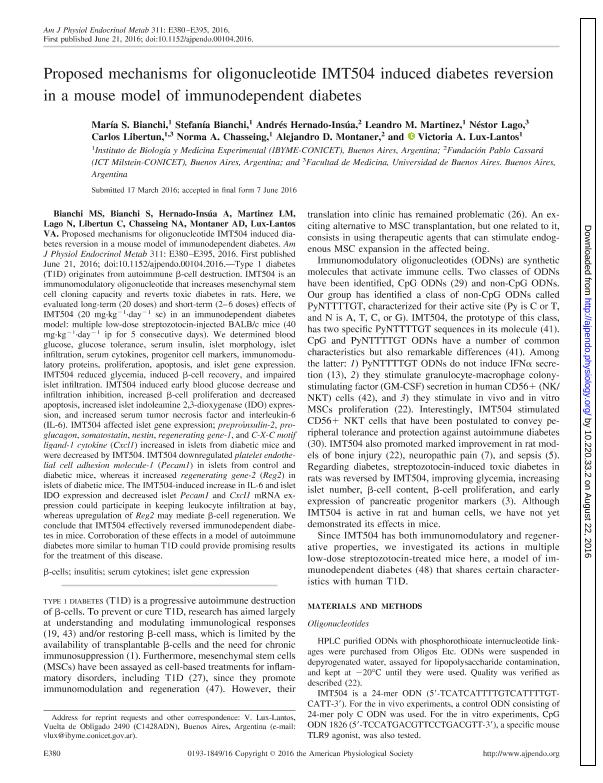Artículo
Proposed mechanisms for oligonucleotide IMT504 induced diabetes reversion in a mouse model of immunodependent diabetes
Bianchi, Maria Silvia ; Bianchi, Stefania
; Bianchi, Stefania ; Hernando Insua, Andrés; Martinez, Leandro Marcelo
; Hernando Insua, Andrés; Martinez, Leandro Marcelo ; Lago, Néstor R.; Libertun, Carlos
; Lago, Néstor R.; Libertun, Carlos ; Chasseing, Norma Alejandra
; Chasseing, Norma Alejandra ; Montaner, Alejandro Daniel
; Montaner, Alejandro Daniel ; Lux, Victoria Adela R.
; Lux, Victoria Adela R.
 ; Bianchi, Stefania
; Bianchi, Stefania ; Hernando Insua, Andrés; Martinez, Leandro Marcelo
; Hernando Insua, Andrés; Martinez, Leandro Marcelo ; Lago, Néstor R.; Libertun, Carlos
; Lago, Néstor R.; Libertun, Carlos ; Chasseing, Norma Alejandra
; Chasseing, Norma Alejandra ; Montaner, Alejandro Daniel
; Montaner, Alejandro Daniel ; Lux, Victoria Adela R.
; Lux, Victoria Adela R.
Fecha de publicación:
21/07/2016
Editorial:
American Physiological Society
Revista:
American Journal Of Physiology-endocrinology And Metabolism
ISSN:
0193-1849
e-ISSN:
1522-1555
Idioma:
Inglés
Tipo de recurso:
Artículo publicado
Clasificación temática:
Resumen
Type 1 diabetes (T1D) originates from autoimmune β-cell destruction. IMT504 is an immunomodulatory oligonucleotide that increases mesenchymal stem cells cloning capacity and reverts toxic diabetes in rats. Here we evaluated long-term (20 doses) and short-term (2-6 doses) effects of IMT504 (20 mg/kg/day, sc) in an immunodependent diabetes model: multiple low dose streptozotocin-injected BALB/c mice (40 mg/kg/day, i.p. for 5 consecutive days). We determined blood glucose, glucose tolerance, serum insulin, islet morphology, islet infiltration, serum cytokines, progenitor cell markers, immunomodulatory proteins, proliferation, apoptosis, and islet gene expression. Long-term results: IMT504 reduced glycemia, induced β-cell recovery and impaired islet infiltration. Short-term analysis: IMT504 induced early blood glucose decrease, infiltration inhibition, increased β-cell proliferation and decreased apoptosis, increased islet indoleamine 2,3-dioxygenase (IDO) expression, increased serum tumor necrosis factor and interleukin-6 (IL-6). IMT504 affected islet gene expression: Preproinsulin-2, Proglucagon, Somatostatin, Nestin, Regenerating gene-1 and C-X-C motif ligand-1 cytokine (Cxcl1) increased in islets from diabetic mice and were decreased by IMT504. IMT504 downregulated Platelet endothelial cell adhesion molecule-1 (Pecam1) in islets from control and diabetic mice, whereas it increased Regenerating gene-2 (Reg2) in islets of diabetic mice. The IMT504-induced increase in IL-6 and islet IDO expression, and decreased islet Pecam1 and Cxcl1 mRNA expression could participate in keeping leukocyte infiltration at bay, whereas upregulation of Reg2 may mediate β-cell regeneration. We conclude that IMT504 effectively reversed immunodependent diabetes in mice. Corroboration of these effects in a model of autoimmune diabetes more similar to human T1D could provide promising results for the treatment of this disease.
Palabras clave:
Diabetes
,
Oligonucleotide
,
Im504
Archivos asociados
Licencia
Identificadores
Colecciones
Articulos(IBYME)
Articulos de INST.DE BIOLOGIA Y MEDICINA EXPERIMENTAL (I)
Articulos de INST.DE BIOLOGIA Y MEDICINA EXPERIMENTAL (I)
Citación
Bianchi, Maria Silvia; Bianchi, Stefania; Hernando Insua, Andrés; Martinez, Leandro Marcelo; Lago, Néstor R.; et al.; Proposed mechanisms for oligonucleotide IMT504 induced diabetes reversion in a mouse model of immunodependent diabetes; American Physiological Society; American Journal Of Physiology-endocrinology And Metabolism; 311; 2; 21-7-2016; E380-E395
Compartir
Altmétricas



